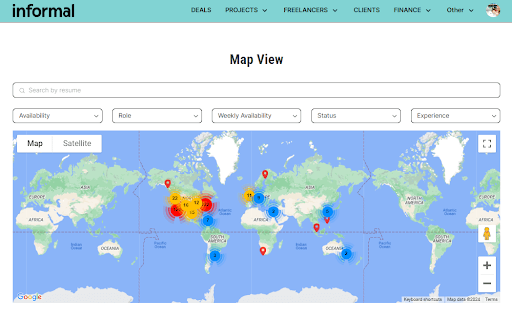The hidden costs of freelance marketplaces

Freelancer marketplaces like Fiverr and Upwork have revolutionized the way businesses outsource tasks and projects. They offer a platform where clients can easily connect with freelancers from around the world to get work done, often at a fraction of the cost of hiring a full-time employee or a professional agency. However, beneath the surface of these seemingly convenient and cost-effective services lie several hidden downsides that can impact both the quality of work and the overall project outcome. In this article, we delve into the “race to the bottom” in terms of cost, the challenges of managing individual freelancers, and the lack of cohesion in projects that can arise when using these platforms, and we see how informal differs.
The problem with the race to the bottom
One of the most significant issues with freelancer marketplaces is the race to the bottom to stay competitive and win projects. Freelancers from different parts of the world, where the cost of living varies dramatically, compete for the same jobs. This global competition often leads to a downward pressure on prices, as freelancers lower their rates to secure work in an oversaturated market. There are many tropes in the hardware world, but one that rings true is “speed, quality, or cost: pick two.” The ripple effects of forcing freelancers to compete on rates impacts the quality of the work, the likelihood of the freelancer staying on projects, and increases the management required on projects.
Quality compromise
Skilled professionals may be deterred from these platforms due to the low rates, leading to a pool of freelancers who may be willing to work for less but lack the necessary experience or expertise. Oftentimes, profiles are fluffed to seem more capable in order to attract clients. It’s typically only after starting a project that the true capabilities of a freelancer can be determined.
At informal, we vet each and every freelancer and prioritize referrals from our network over all else. Our network of 400+ freelancers are all connected within a few degrees of separation, ensuring our network is full of experts we trust. Our freelance form also gathers information on experience, location, tools, and availability, which allows us to match individuals on roles instead of an “open call” for anyone to bid on a project. As a client, this means you’re matched with the right team with the right experience. As a freelancer, it means you don’t need to compete and will receive work that fits your skill set and availability.
Unsustainable freelancing
At informal, we avoid these issues by working with our freelancers to help them set rates that are sustainable and provide them with enough income to continue freelance work for the long run. This reduces the “churn” on projects, prevents burnout, and helps ensure quality work. If a team member does need to drop from a project, informal covers the cost to find and onboard a replacement. Data is securely stored and shared on a need-to-know basis with our network, making handoffs easy.
Managing individual freelancers
Another challenge of using freelance marketplaces is the need to manage each freelancer individually. Unlike working with an agency that provides a project manager to oversee the work, clients must take on the role of manager themselves when hiring freelancers. This involves frequent meetings, timeline updates, and double-checking work to avoid last minute surprises—which all slows down progress and can cause massive project delays. Clients must also manage the payment and invoicing process for each freelancer, which can get complicated with larger teams.
At informal, we’ve created streamlined collaboration and project management tools that make it easier for teams and individuals to track time against clear deliverables and summarize updates on a weekly, monthly, or bi-weekly basis. Our tools also automate the process of consolidating time entries into invoices, handle payroll for each team member, and we have systems in place to prevent team members from exceeding their project budgets without approval. As a result, clients can focus on their core business instead of acting as project manager, human resources, and a finance team, while freelancers can focus on delivering quality work.

Lack of cohesion in projects
Working with a single freelancer on a marketplace can be challenging enough. Managing a team can get even more complicated. When different freelancers are responsible for various components of a project, there’s a risk of lack of cohesion in the final product. Each freelancer may have their own style, approach, and understanding of the project requirements, leading to inconsistencies in the work. Files need to be shared in a consistent manner, messaging platforms and email chains need to be created and managed, and the time required to coordinate and stay aligned can add up quickly.
Informal can help by providing a single communication channel for the team, a shared drive for projects, and templates for defining the product requirements and scopes of work. We’ve spent the last 6 years testing and refining our processes to ensure teams can work well together with minimal intervention and delay.
If you’re looking to work with some of the best hardware freelancers and consultants, we’re here for you! Informal exists to make freelancing a viable option to keep teams lean and reduce startup costs. Contact us today to see how we make working with freelancers better for everyone.